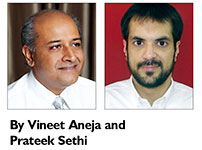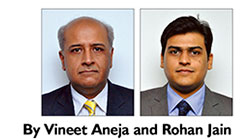 It is observed that India has the potential to attract even more foreign investment which could be achieved by liberalising and simplifying the Foreign Direct Investment (‘FDI’) regime. With such intent, the Union Government has brought its second major reform (after the last changes having been announced in November 2015) by liberalising the FDI regime. With such reforms and most of the sectors falling under the automatic route, India is now one of the most open economies in the world for FDI according to several international agencies. The reforms introduced to the Consolidated FDI Policy of 2016 by way of Press No. 5 (2016 Series) as issued by the Department of Industrial Policy & Promotion include increase of sectoral caps, bringing more sectors under the automatic route and easing of conditionalities for foreign investment. Following are the key highlights of the reforms. Defence sector Now, foreign investment beyond 49 percent has been permitted through approval route in cases resulting in access to modern technology in the country or for other reasons to be recorded. The condition of access to ‘state-of-art’ technology in the country has been done away with. Pharmaceutical sector Civil aviation sector Food products Private security agencies Animal husbandry Establishment of branch office, liaison office or project office Single brand retail trading Conclusion ––––––––––––––– |
India
Related Articles by Firm
Mare Maritime Singapore Pte Ltd Vs. M.T. Everrich 8 [Notice of Motion (L) No. 2418 of 2015 in Admiralty Suit No. 854 of 2015]
Background: The owners of EVERRICH 8 (the Vessel), through their subsidiary Yuanland Ltd, entered into voyage charterparty with Rakha Al Khaleej International LLC ...
India's The Arbitration and Conciliation (Amendment) Ordinance, 2015 makes major changes to the Arbitration & Conciliation Act, 1996
The Arbitration and Conciliation (Amendment) Ordinance 2015 gives the necessary impetus for ease of conducting arbitration in India and enables speedy settlement of commercial disputes.
Multiple lenders = multiple stamping
On August 11, 2015 the division bench of the Supreme Court of India overturned a full bench decision of the Gujarat High Court in the matter of Coastal Gujarat Power Limited v. Chief Controlling Revenue Authority....
Indian patent office revokes Hoffman-La Roche’s ‘Valganciclovir’ patent
The Controller of Patents (India) recently revoked the patent granted for the anti-retroviral drug ‘Valganciclovir’ used for treating active cytomegalovirus retinitis infection (CMV) ...
Urban reforms – three urban rejuvenation schemes launched
There is a compelling need to develop sustainable and technology-driven urban centres, partly as the burgeoning urban population is creating pressure on existing cities and partly to address the growing ...
Highlights of the Companies (Amendment) Act, 2015
The Companies (Amendment) Act, 2015 (Amendment Act), which aims to amend the rigidities of the Companies Act, 2013 (Act), has ...
India - Projects, energy and infrastructure update
Including: Long-term infrastructure bonds;Smart cities mission and urban rejuvenation scheme; Railways to e-auction re-development of stations; New hybrid annuity model of PPP for the road sector; Shell set for global acquisition of BG; and IFC signs master co-operation agreement ...
The New Land Bill – ground reality
The Right To Fair Compensation And Transparency in Land Acquisition, Rehabilitation and Resettlement (Amendment) Bill, 2015 (2015 Bill) was …
Prima Facie Validity of a registered trade mark in India – A strong but rebuttable presumption
The Indian trademarks law recognises both statutory as well as common law remedy to protect the rights of the proprietor of a trade mark. However, it is well-known that …
Insurance Laws (Amendment) Bill passed as ordinance in India
The long-awaited Insurance Laws (Amendment) Bill (the Bill) has become a provisional law in India. The Bill, which could not be passed in Parliament in its winter session, was promulgated by the President …
Need for uniform stamp duty incidence across all States of India
‘Stamp Duty’ is a tax levied on an instrument by which any right or liability is, or purports to be created, transferred, limited, extended, extinguished or recorded …
‘Make in India’ campaign: Opportunities for investors
With a vision of leading the economy towards a path of high sustainable growth, the Prime Minister of India on September 25th, 2014 launched the ‘Make in India’ campaign. Through the …
Bumpy road ahead for vehicle manufacturers in India – pulled up by the competition watchdog
South Asian markets are one of the fastest growing markets for vehicle manufacturers worldwide. However, doing business in South Asia has its own challenges. The anti-monopoly watchdog of India …
Introduction of real estate investment trusts in India
The Real Estate Investment Trusts (REITs) in India have been in the news for some time. The World Bank1 describes REIT as a security sold to investors for the purpose of investing in real estate. REITs …
SC Larger Bench decision in case of Kone Elevators – distinction between ‘contracts of sale’ vis-a-vis ‘works contract’
The Constitutional Bench of the Hon’ble Supreme Court (SC), over-ruling the earlier decision of three-member Bench re State of A.P. v. Kone Elevators (India) Ltd1, has held that the activity of manufacturing, …
Companies Act, 2013 – implications for investors
One of the recent initiatives of the Indian Government towards ensuring sustainable economic growth and improving investment climate is enactment …
India Update, inc. Medical device controls
An overview of how and where regulatory controls apply to medical devices in India. Plus: key judgements passed by the Hon’ble Supreme Court; changes in corporate and commercial
matters; and case laws in indirect taxation.
Related Articles
Related Articles by Jurisdiction
Compulsory licensing of patents in India: a human rights issue as well!
The compulsory licensing regime in India has always been embroiled in controversy, more so when it involves compulsory ...
Bumpy road ahead for vehicle manufacturers in India – pulled up by the competition watchdog
South Asian markets are one of the fastest growing markets for vehicle manufacturers worldwide. However, doing business in South Asia has its own challenges. The anti-monopoly watchdog of India …
Delhi High Court resolves uncertainty between two conflicting clauses in contracts
The settled principle of contra proferentem has been re-affirmed by the Court in a case involving Delhi Metro Rail and Voestalpine.
Latest Articles
































